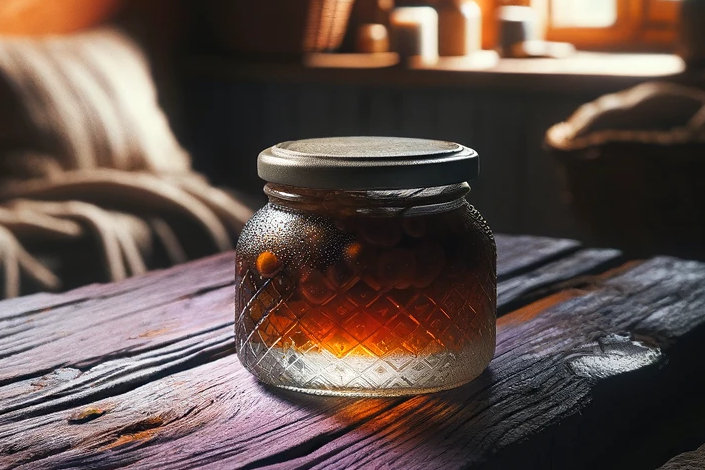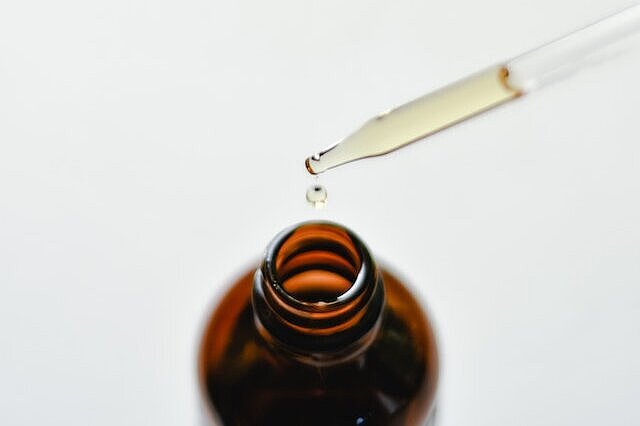Benzalkonium chloride

How does benzalkonium chloride affect dogs?
Benzalkonium chloride is not only an effective antiseptic, but also a powerful cytotoxin. If it gets onto the skin or mucous membranes of dogs, it can damage the tissue and cause inflammation. This can result in chemical burns, ulcers, wounds and infections. The oral cavity, eyes, stomach and oesophagus are particularly affected.
Dogs can come into contact with benzalkonium chloride by:
- walking or lying over freshly cleaned surfaces
- licking or nibbling on freshly cleaned surfaces
- drinking from or knocking over cleaning buckets or bottles
- Inhaling or swallowing cleaning agents
What are the symptoms of benzalkonium chloride poisoning in dogs?
The symptoms of poisoning with benzalkonium chloride can vary depending on the type and duration of contact. They usually occur with a delay, i.e. only after a few hours or even days. Possible signs are
- increased salivation
- Pain when eating or swallowing
- Vomiting or diarrhea
- Blood in vomit or feces
- Difficulty breathing or coughing
- Fever or shock
- Swelling or redness around the mouth
- Ulcers or blisters on the tongue or in the throat
- Clouding or ulceration of the cornea
- Conjunctivitis or eye discharge
- Skin rash or sore
Which products contain benzalkonium chloride?
Benzalkonium chloride is contained in many products that are supposed to have an antibacterial or disinfectant effect. These include, for example:
- All-purpose cleaners such as Sagrotan or hygiene cleaners
- Laundry hygiene additives for sportswear
- Skin and surface disinfectant sprays and wipes
- Antibacterial soaps and lotions
- Mold cleaner
- Terrace cleaner against algae and green mold
To check whether a product contains benzalkonium chloride, you should always read the label or research the ingredients online.
What should you do if your dog has been in contact with benzalkonium chloride?
If the dog has had contact with a product containing benzalkonium chloride, you should act immediately:
- Keep the dog away from the source and prevent it from licking or scratching further.
- Rinse or rinse the affected area with plenty of water.
- Call the vet and ask for advice.
- Visit the vet and take the product with you.
Poisoning with benzalkonium chloride can be life-threatening. The faster the dog is treated, the better the chances of recovery.
How can poisoning with benzalkonium chloride be prevented?
To avoid poisoning with benzalkonium chloride, you should take a few precautions:
- Keep cleaning agents and disinfectants out of the reach of dogs.
- After cleaning, allow the surfaces to dry thoroughly before the dog has access to them again.
- Alternatively, use products that do not contain benzalkonium chloride or are less harmful.
- Supervise the dog when it is in rooms that have just been cleaned.
- Examine the dog regularly and look for changes in the mouth, eyes or skin.
Benzalkonium chloride is a substance that is contained in many cleaning agents and disinfectants and can be very dangerous for dogs. It can lead to chemical burns, ulcers, wounds and infections, which can be life-threatening. To avoid poisoning, you should store the products safely, allow the surfaces to dry after cleaning and supervise the dog.
Properties 12
Are you looking for other ingredients with a specific property?
Just click on them to find more.
If you notice any signs of hypersensitivity or poisoning in your dog, you should see your vet immediately. We are not a substitute for a vet, but we try to be as accurate as possible. Every dog reacts differently and we recommend you get a second opinion or consult your vet if in doubt.
Stay healthy and take good care of your four-legged friend!😊
Similar to Benzalkonium chloride
Benzethonium chloride is a quaternary ammonium compound that has a positive charge and acts as a preservative, antiseptic and anti-infective. This means that it prevents the growth of bacteria and...
Triclosan is a chemical compound that is used in a variety of consumer products due to its powerful antibacterial and fungicidal effects. From toothpaste and soaps to textiles and kitchen utensils,...
Chlorhexidine is an active ingredient that belongs to the group of biguanides. It has an antibacterial and antifungal effect, i.e. it kills bacteria and fungi or inhibits their growth. Chlorhexidine...
Ethanol can enter the dog's body in various ways. The most common route is oral ingestion, e.g. when the dog consumes alcohol-containing drinks, food or medication. Ethanol can also enter the dog's...



